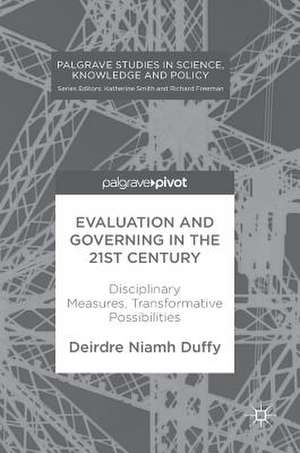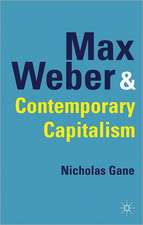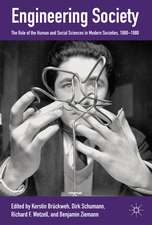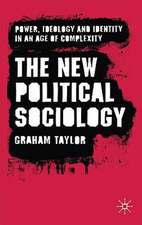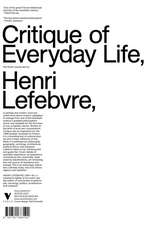Evaluation and Governing in the 21st Century: Disciplinary Measures, Transformative Possibilities: Palgrave Studies in Science, Knowledge and Policy
Autor Deirdre Niamh Duffyen Limba Engleză Hardback – 16 noi 2017
This book interrogates the role played by evaluation in 21st century governing. Using youth work in the UK as a case study, it challenges the narrative of evidence-based policy-making, arguing instead that evaluation research is used to discipline and control. At the same time, drawing on the work of Michel Foucault and Gilles Deleuze, this book argues that evaluation can be reclaimed and facilitate transformation. In bringing these theoretically rich discussions to bear on the domain of contemporary evaluation, the author provokes an alternative reading of the relationship between research and governing, emphasising how knowledge production has historically been manipulated by elites towards their own political ends. As the debate around elite’s use of research expands globally, this book is a nuanced interjection into both established evidence-based policy and emergent narratives of ‘post-truth’. Challenging and provocative, this innovative work will appeal to students and scholars of social and public policy, and governance and public management.
Preț: 419.21 lei
Nou
Puncte Express: 629
Preț estimativ în valută:
80.24€ • 87.19$ • 67.45£
80.24€ • 87.19$ • 67.45£
Carte tipărită la comandă
Livrare economică 22 aprilie-06 mai
Preluare comenzi: 021 569.72.76
Specificații
ISBN-13: 9781137545121
ISBN-10: 1137545127
Pagini: 224
Ilustrații: XV, 161 p.
Dimensiuni: 148 x 210 x 18 mm
Greutate: 0.37 kg
Ediția:1st ed. 2017
Editura: Palgrave Macmillan UK
Colecția Palgrave Macmillan
Seria Palgrave Studies in Science, Knowledge and Policy
Locul publicării:London, United Kingdom
ISBN-10: 1137545127
Pagini: 224
Ilustrații: XV, 161 p.
Dimensiuni: 148 x 210 x 18 mm
Greutate: 0.37 kg
Ediția:1st ed. 2017
Editura: Palgrave Macmillan UK
Colecția Palgrave Macmillan
Seria Palgrave Studies in Science, Knowledge and Policy
Locul publicării:London, United Kingdom
Cuprins
Preface: Evaluation and governing in two quotes or When the arithmetician met the curator.- Chapter 1: Introduction.- Chapter 2: Understanding Evaluation in the UK.- Chapter 3: Disciplinary Measures.- Chapter 4: Transformative Possibilities.
Recenzii
“Duffy’s new book engages with the many uses and abuses of evaluation in UK politics. … Duffy compares the many ways in which people could, do, and should use evaluation to inform policy and policymaking. … As such, Duffy’s book stands out as a critical theoretical take on the role of evidence in policy making and evaluation. I commend to people who want to broaden their horizons.” (Paul Cairney, Paul Cairney: Politics & Public Policy, paulcairney.wordpress.com, May, 2018)
Notă biografică
Deirdre Niamh Duffy is Senior Lecturer in Childhood, Youth Studies and Social Policy at Manchester Metropolitan University, UK.
Textul de pe ultima copertă
This book interrogates the role played by evaluation in 21st century governing. Using youth work in the UK as a case study, it challenges the narrative of evidence-based policy-making, arguing instead that evaluation research is used to discipline and control. At the same time, drawing on the work of Michel Foucault and Gilles Deleuze, this book argues that evaluation can be reclaimed and facilitate transformation. In bringing these theoretically rich discussions to bear on the domain of contemporary evaluation, the author provokes an alternative reading of the relationship between research and governing, emphasising how knowledge production has historically been manipulated by elites towards their own political ends. As the debate around elite’s use of research expands globally, this book is a nuanced interjection into both established evidence-based policy and emergent narratives of ‘post-truth’. Challenging and provocative, this innovative work will appeal to students and scholars of social and public policy, and governance and public management.
Caracteristici
Makes a significant contribution to our understanding of the theory of evaluation Connects evaluation practice to neoliberalism and austerity Demonstrates that evaluation can make a radical contribution to progressive policy and practice Includes supplementary material: sn.pub/extras
